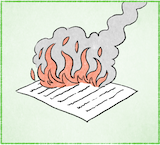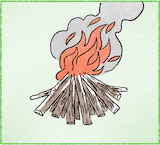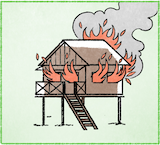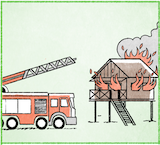



นี้คืออี่หยัง อันนี้กะดาด กะดาดมันกำลังถืกไฟไหม้
เป็นหญังไฟคือไหม้กะดาด จักคือกัน จักว่าไฟเป็นหญังมันคือไหม้กะดาด จักว่าไฟมันมาแต่ใส คือได้มาไหม้กะดาดแผ่นนี้
แล้วไฟนี้มันไหม้โดนบ่ กะหน้าสิบ่โดน กะอาดสิไหม้บ่โดนปานใด
เพาะว่ากะดาดมันแผ่นน้อยๆ หนึ่ง ไฟมันไหม้แป่บเดียว กะดาดแผ่นนี้กะสิเบิดแล้ว ขั้นกะดาดเบิดแล้ว ไฟมันกะสิดับลง ไฟมันกะสิเซาไหม้ หลือว่าเซาติด
2
นี้คืออี่หยัง อันนี้กะเป็นกองไฟ หลือว่ากองฟืน ตอนนี้ไฟ[มัน]กำลังไหม้กองฟืนนี้อยู่
ฟืนนี้คืออี่หยัง ฟืนหนิกะเป็นท่อนไม้นั้นหละ เป็นกกไม้ เป็นต้นไม้ เอาต้นไม้ต้นน้อยๆ ใหญ่ๆ เอามาฮาน หลือว่ามาฟันๆๆ ให้มันซิ้นน้อยๆ หลือว่าให้มันท่อนน้อยๆ กะสิกายเป็นฟืนหลือว่าต้นฟืน
ตอนนี้อยู่กองไฟมันมีต้นฟืนหลายต้นบ่ หลือว่ามันมีหลายท่อนบ่ กะหลายท่อนอยู่ เป็นสิบยี้สิบท่อนพุ้นแหล้ว วางกองกันอยู่ วางท้อนกันอยู่ หลายท่อนหลายต้นคัก แล้วไฟมันกะกำลังไหม้อยู่ กำลังไหม้ต้นฟืนนั้นหละ กำลังไหม้กองฟืนนั้นหละ
3
ตอนนี้เกิดอี่หยังขึ้น ตอนนี้ไฟกำลังไหม้บ้าน ไฟกำลังไหม้เฮียน ตอนนี้ไฟกำลังไหม้เฮียนอยู่
ไฟไหม้เฮียนพุใด จักหละเด้อบัดหนิ จักว่าไฟไหม้เฮียนพุใด ฮู้แต่ว่าตอนนี้ไฟมันกำลังไหม้บ้านไหม้เฮียนคนอยู่ ไหม้บักแฮงหนึ่ง ลุก[...]ขึ้นพุ้นหนะ จักว่าไฟมาแต่ใส
มันดีบ่ขั้นไฟไหม้บ้านหนิ กะบ่เลว กะบ่ดีปานใดเลว ขั้นพุใดไฟไหม้บ้านกะซวยเติบพุ้นแหล้ว ของอยู่ในบ้านกะเสียหายเบิด กะพังเบิด กะเสียเบิด
ซู่คนบ่คิดว่ามันดีดอก ขั้นไฟไหม้บ้านหนิ มีแต่ความเสียหาย มีแต่ความหายยะนะ
แล้วไฟนี้มันไหม้โดนไป่ กะจักคือกัน จักว่าไหม้โดนหลือบ่โดน ฮู้แต่ว่ามันกำลังไหม้เฮียนหลังนี้อยู่ กะอาดสิไหม้แต่โดนนั้นหละพุ้นหนะ ไหม้เบิดบ้านเบิดเฮียนเอาโลด
4
เกิดอี่หยังขึ้นตอนนี้ ตอนนี้กะไฟไหม้บ้านอยู่ จักว่าไฟไหม้บ้านพุใด ลุกบักแฮงหนึ่ง ลุกบักคักพุ้นหนะ ไหม้คักอี่หลี
แล้วมีคนมาซ่อยดับไฟบ่ กะมีอยู่พุ้นหนะ แนมเห็นลดคันหนึ่ง มีลดคันหนึ่ง กะอาดสิเป็นลดดับเพิงกะได้ เขาอาดสิมาซ่อยเหลียในกานดับเพิงหลือว่าดับไฟไหม้หม้องนี้กะได้
Link to overview page
Link to dictionary
| Isaan | Pronunciation | Tones | Thai | English/Notes |
|---|---|---|---|---|
| นี้ | ni: | HF | นี้ | 1. this 2. here |
| คือ | khʉ: | HR | คือ | 1. to be, to resemble, like, as 2. why {บักหล้าคือบ่เก็บโต่ะแน่ = [addressing a young boy] Why haven't you cleared the table?} |
| อี่หยัง | i:-yaŋ | H-M | อะไร | 1. what {นี้คืออี่หยัง = What is this?} {มื้อนี้เจ้าเฮ็ดอี่หยัง = What are you doing today?} {กินเข้างายกับอี่หยัง = What did you have for breakfast?} 2. something, anything, (in negations) nothing {บ่ต้องเฮ็ดอี่หยังอีกเลยนอกจากใส่ปุย = [we] don't need to do anything besides adding fertilizer} |
| อัน | an | M | อัน | 1. thing, object 2. general clf. for objects |
| กะดาด | ga-da:t | M-LF | กระดาษ | paper |
| มัน | man | HR | มัน | it (also used to refer to people) |
| กำลัง | gam-laŋ | M-HR | กำลัง | auxiliary indicating continuous or progressive action |
| ถืก | thʉ:k | LF | ถูก | marker for passive {ขั้นมันถืกความฮ้อนมันกะละลาย = when it is exposed to heat, it melts} {เฮ็ดในสิ่งที่บ่ดี เขากะเลยต้องถืกจับ = [he's] done something bad, so he gets arrested} {กะดาดมันกำลังถืกไฟไหม้ = the paper is burning} |
| ไฟ | fai | HR | ไฟ | 1. fire, flame 2. electricity, power 3. light |
| ไหม้ | mai | LF | ไหม้ | 1. to burn, to catch fire 2. to be on fire 3. burnt |
| เป็น | pen | M | เป็น | 1. to be, to exist 2. to be able to 3. to suffer, sth. happens to 4. เป็นหญัง[...]คือ in initial position: why? {เป็นหญังเขากะคือแปงฟัน = Why is he brushing his teeth?} {เป็นหญังเคี่ยงบินมันคือสิตก = Why is the airplane falling down?} |
| หญัง | ɲaŋ | M | อะไร, เป็นหญัง = ทำไม | 1. what {เขากำลังเฮ็ดหญัง = What is he doing?} {ธูปเอาไว้เฮ็ดหญัง = What are incense sticks for?} 2. something, anything, (nothing) 3. เป็นหญัง[...]คือ in initial position: why {เป็นหญังเขาคือใส่บักพิกลงไปในกวยเตียว = Why is he putting chili in [his] noodle soup?} {เป็นหญังหน้าต่างมันคือเปิด = Why is the window open?} {เป็นหญังมันคือมีควนไฟ = Why is there smoke?} |
| จัก | jak | M | จัก | 1. answer to a question: [I] don't know, don't know exactly, [I'm] not sure {พุซายคนนี้เขาเถ้าไป่ จัก จักเถ้าหลือบ่เถ้า เบิ่งบ่ค่อยออก = Is this man here already old? I don't know. I can't see clearly whether he's old or not.} {เขาเว้ากันอยู่ใส จักคือกัน = Where are they talking? I don't know either.} 2. exact(ly), what exactly {จักต้มอี่หยังกะบ่ฮู้ = I don't know what (exactly) he is cooking} {บ่ลู้คือกันจักปาอี่หยัง = I don't know either what kind of fish this is} 3. how much/many? {ต้นไม้มีจักต้น = How many trees are there?} {ตอนนี้จักโมงแล้ว = What time is it now?} {มือของเฮานี้สิมีจักนิ้ว = How many fingers do our hands have?} 4. a bit, a little bit {จักหน่อย/จักหน่อยหนึ่ง = a bit, a little bit} |
| คือกัน | khʉ:-gan | HR-M | เหมือนกัน | 1. also, likewise, similarly {ยินดีที่ได้ฮู้จักคือกันคับ = Nice to meet you too!} 2. in negative sentences: either {บ่ลู้คือกัน = I don't know either} {จักคือกัน = I don't know (either)} |
| ว่า | wa: | H | ว่า | 1. that, as {คำว่า X = the word X} 2. to say |
| มา | ma: | HR | มา | 1. to come 2. auxiliary expressing action towards the present or focal time {กะคุเฮ็ดมาจากอี่หยัง = What is the bucket made of?} {แล้วเขากะเก็บเงินจากพุนั้นมา = and then she takes the money of that person} |
| แต่ใส | tɛ:-sai | H-M | จากไหน | where from? |
| ได้ | dai | HF | ได้ | 1. can 2. to get, to obtain 3. before verb: indicating past tense 4. บ่ได้ + verb: not |
| แผ่น | phɛn | H | แผ่น | clf. for pieces/pages of paper {สะหมุดมีหลายแผ่นบ่ = Does the notebook have many pages?} {กะดาดแผ่นนี้ = this piece of paper} |
| แล้ว | lɛ:o | HF | แล้ว | 1. finished 2. already 3. and then, and next (especially แล้วกะ) 4. auxiliary for past tense |
| โดน | do:n | M | นาน | time: long |
| บ่ | bɔ: | H | ไม่ | 1. no, not 2. question particle, transforming a statement into a question Notes: spelling exception in line with common usage on social media |
| กะ | ga | M | ก็ | 1. then, consequently 2. also |
| หน้า | na: | LF | หน้า | 1. front {ปะตูหน้า = front door} 2. face {เขากำลังล้างหน้า = he's washing his face} 3. auxiliary: conditional tense {เขาหน้าสิเป็นพุบ่าวพุสาวกัน = they are probably groom and bride} {กะหน้าสิส้มอยู่ = it's likely to be sour} 4. season {หน้าฮ้อน = hot season} 5. page 6. clf. for pages {เฮาอ่านฮอดหน้านั้นแล้ว = we've read until this page} |
| สิ | si | M | จะ | future tense auxiliary {เขากำลังสิตื่น = he's about to wake up} {สิไปตะหลาด = [I'm] going to the market} |
| อาด | a:t | LF | อาจ | 1. might, may, will 2. likely |
| ปานใด | pa:n-dai | M-M | เท่าไหร่, มาก | 1. after negative: (not) very, (not) so much {บ่ใหญ่ปานใด = not so large, not very large} 2. how much, how many {เฮาบ่สามาดนับได้ว่ามันมีหลายปานใด = it's impossible to count how many there are} |
| เพาะว่า | phɔ-wa: | H-H | เพราะว่า | because |
| น้อย | nɔ:i | HF | น้อย | 1. few, little 2. small |
| หนึ่ง | nʉŋ | H | หนึ่ง | 1. one 2. after adjective: intensifier {บักคักหนึ่ง = very much} {อันบักใหญ่หนึ่ง = very large}, or attenuates the meaning {กะดาดมันแผ่นน้อยๆ หนึ่ง = the piece of paper is [relatively] small} |
| แป่บเดียว | pɛp-di:ao | H-M | แป๊บเดียว | just a moment |
| เบิด | bə:t/bət | LF/M | หมด | 1. completely, totally, entirely {เทิงเบิด = all of them} {เบิดมื้อเบิดค่ำ = [all] day and night} {ขั้นพุโดยสานลงลดไฟเบิดแล้ว [...] = when all passengers have disembarked […]} {เขากินเบิดบ่ = Has he eaten all of it?} 2. to be finished, to be exhausted, to come to an end, to have no more {โน่ดบุ่กแบ็ดเบิด = the notebook is out of battery/the notebook needs recharging} |
| ขั้น | khan | LF | เมื่อ | when, if |
| ดับ | dap | M | ดับ | 1. inactive, out (light, electronic device) 2. to extinguish (e.g., a fire, smell etc.) {ดับไฟ = to extinguish a fire} {ลดดับเพิง = fire truck} |
| ลง | loŋ | HR | ลง | 1. to descend, to lower, to go down 2. down 3. bus/train etc.: to get off, to disembark {คนกำลังลงลดบั่ด = people are getting off the bus} 4. boat/ship etc.: to get on, to board {เขากำลังญ่างลงเลีย = he's boarding/getting on the boat} |
| เซา | sao | HR | จบ | 1. to stop, to be finished {น้ำมันเซาไหลแล้ว = the water has stopped flowing} {ฝนเซาตกแล้ว = it has stopped raining} {มันสิเซาเสียงดัง = (phone) it stops ringing loudly} 2. to prevent, to hinder 3. to rest {เซาเมี่ยย = to rest} |
| หลือ | lʉ: | M | หรือ | or |
| ติด | tit | M | ติด | to light, to ignite {ขั้นบ่กดปุ่ม มันกะบ่ติด = [of a device or appliance] if you don't press the button, it won't start} |
| กองไฟ | gɔ:ŋ-fai | M-HR | กองไฟ | bonfire, campfire |
| กอง | gɔ:ŋ | M | กอง | 1. pile, heap {กองไฟ = bonfire, campfire (see separate entry)} {กองฟืน = bonfire, campfire, a pile of logs/pieces of wood} {กองเฟียง = haystack} 2. to pile, pile up, heap, stack {วางกองกันอยู่ = being piled up} |
| ฟืน | fʉ:n | HR | ฟืน | firewood |
| ตอนนี้ | tɔ:n-ni: | M-HF | ตอนนี้ | now |
| อยู่ | yu: | H | อยู่ | 1. to be (located) at 2. yet, still 3. auxiliary indicating continuous or progressive action {ทอดปาอยู่ในกะทะ = (in the process of) frying a fish in the pan} {แม่กำลังเมี้ยนเฮียนอยู่ = mother is cleaning/tidying up the house} |
| หนิ | ni | M | นี่แหละ, เหรอ/หรอ | 1. particle used to emphasize a statement or form (or add to) a question {เป็นตาแซบคือหญังหนิ = it's really tasty} {เคี่ยงพอเท่าๆ หนิ = the [radio] is appropriately sized (i.e., not too large)} 2. variant of นี้ = this Notes: translation to be determined; maybe sometimes like Thai นี่แหละ; other examples given: อยู่ใสหนิ อยู่ตลาดหนิ กินเข้าไป่หนิ |
| ท่อนไม้ | thɔn-mai | H-HF | ท่อนไม้ | log, piece of wood |
| นั้นหละ | nan-la | HF-M | นั่นแหละ | auxiliary for emphasis at the end of a phrase |
| กกไม้ | gok-mai | M-HF | ต้นไม้ | tree |
| ต้นไม้ | ton-mai | HF-HF | ต้นไม้ | tree |
| เอา | ao | M | เอา | to take, to give {เขากำลังเอาก่องไปซั่ง = he's taking the boxes to weigh them} {หมอกำลังเอายาให้คนป่วยกิน = the doctor is giving medicine to the patient} {เอาไว้ถ้า = is for, is used for, has the purpose of} |
| ต้น | ton | HF | ต้น | 1. clf. for trees, plants, logs/pieces of wood {ต้นไม้ต้นใหญ่ = a large tree} {ต้นฟืน = log/piece of wood} 2. first, primary, initial {ลูกคนต้นหมู่ = first child} |
| ใหญ่ | ɲai | H | ใหญ่ | large, big |
| ฮาน | ha:n | HR | ตัดต้นไม้ใหญ่, ตัดกิ่งไม้ | to cut down a tree, to cut down branches of a tree |
| ฟัน | fan | HR | ฟัน | to cut, to hack, to chop |
| ให้ | hai | LF | ให้ | 1. to give {หมอกำลังเอายาให้คนป่วยกิน = the doctor is giving the patient medicine} 2. for 3. to allow, to be allowed |
| ซิ้น | sin | HF | ชิ้น | 1. piece, slice 2. skin {หนีบซิ้น = to pinch the skin} |
| ท่อน | thɔn | H | ท่อน | clf. for timber cutoffs, pieces of wood, logs |
| กาย | ga:i | M | กลาย | to become, to turn into, to change to |
| มี | mi: | HR | มี | 1. to have 2. there is |
| หลาย | la:i | M | เยอะ, มาก | many, much, very |
| สิบ | sip | M | สิบ | ten |
| ยี้สิบ | yi:-sip | HF-M | ยี่สิบ | twenty |
| พุ้นแหล้ว | phun-lɛ:o | HF-LF | นู่นแหละ | auxiliary for emphasis at the end of a phrase Notes: variant of พุ้นหละ |
| วาง | wa:ŋ | HR | วาง | to place, to set/put down {โทละสับ/phone: วางสาย = to hang up} {มีเกิบวางอยู่ในก่อง = there are shoes in the box} {มือข้างหนึ่งเขาวางอยู่เทิงโต่ะ = he's put one of his hands on the table} |
| กัน | gan | M | กัน | mutual, each other, with another, together {เขากำลังนั่งเว้ากัน = they're sitting and talking} {เขาสองคนฮักกัน = they love each other} {ปาสองโตนี้ ใหญ่ห่างกันหลายบ่ = These two fish here, are they very different in size (from each other)?} {ต่างกัน = to be different (from each other)} {ก่องอันไหนหนักกว่ากัน = Which box is heavier (than the other(s))?} |
| ท้อน | thɔ:n | HF | รวม, ซ้อน, กองไว้ | to gather together, to pile up |
| คัก | khak | H | intensifier: very, very much | |
| เกิด | gə:t | LF | เกิด | 1. (often together with ขึ้น) to happen, to arise, to take place {เกิดอี่หยังขึ้น = what is happening?} {บ่มีหญังเกิดขึ้น = nothing's happening} 2. to be born 3. to grow {หนวดกะคือสิเกิดอยู่ใต้ดัง = a moustache grows below the nose} |
| ขึ้น | khʉn | LF | ขึ้น | 1. to go up, to increase 2. sun: to rise {ตะเว็นกำลังขึ้น = the sun is rising} 3. more 4. bus/train etc.: to get on, to board {พุโดยสานขึ้นลดไฟเบิดแล้ว = all passengers have boarded the train} |
| บ้าน | ba:n | HF | บ้าน | 1. house, home 2. village (also used as a prefix before the name of a village) 3. home country, home region {บ้านเฮาเฮ็ดเข้าจั่งใด = How do we plant rice in Isaan/Thailand?} |
| เฮียน | hi:an | HR | เรือน | house, home |
| พุใด | phu-dai | H-M | ใคร | 1. who {มีพุใดโทมากะบ่ลู้ = I don't know who has called} {ห้องนอนของพุใด = whose bedroom (is this)? } 2. someone, somebody, anybody, in negative context: nobody {บ่มีพุใดอยู่กับเขาเลย = there's nobody with him} |
| หละ | la | M | แหละ, ล่ะ | 1. auxiliary for emphasis at the end of a phrase 2. auxiliary to create a follow-up question: And what about ... ? {แล้วลดคันที่สองหละ = And what about the second car?} |
| เด้อ | də: | HF | final particle | |
| บัดหนิ | bat-ni | M-M | [...] บัดหนิ = ทีนี้ [...] | final particle: adds a sense of immediacy |
| ฮู้ | hu: | HF | รู้ | 1. to know 2. to understand Notes: equivalent to ลู้ |
| แต่ว่า | tɛ:-wa: | H-H | แต่ว่า | 1. but 2. only {ฮู้แต่ว่าเขายืนอยู่พุเดียว = I only know that he's standing there by himself} |
| คน | khon | HR | คน | person, people |
| บัก | bak | M | 1. intensifier before adjectives {ปาโตบักใหญ่ = a (very) large fish} 2. prefix in front of fruits and vegetables {บักแตงโม = watermelon} 3. can be used as a reference for a male person of the same or younger age {บักอันนี้ = this lad} |
|
| แฮง | hɛ:ŋ | HR | แรง | 1. strong {ลมกำลังพัดแฮงอยู่ = to wind is blowing strongly} 2. loud {เสียงแฮง = loud} 3. strength, power |
| ลุก | luk | H | ลุก | 1. to be in flames, to burn 2. to rise, to get up, to stand up |
| พุ้นหนะ | phun-na | HF-H | นู่นแหละ | auxiliary for emphasis at the end of a phrase Notes: variant of พุ้นหละ |
| ดี | di: | M | ดี | good |
| เลว | le:o | HR | particle emphasizes negation {กะบ่เลว = no, not at all} {จักเลว = I don't know!} Notes: [Ton] can maybe also carry M tone |
|
| ซวย | su:ai | HR | ซวย | unlucky |
| เติบ | tə:p | LF | intensifier: very, much {เว้ากันโดนเติบ = to talk a long time} | |
| ของ | khɔ:ŋ | M | ของ | thing, object |
| ใน | nai | HR | ใน | in, within |
| เสียหาย | si:a-ha:i | M-M | เสียหาย | to damage |
| พัง | phaŋ | HR | พัง | 1. to be destroyed 2. to be damaged, broken |
| เสีย | si:a | M | เสีย | 1. to deteriorate, to go bad 2. to die {เสียซีวิด = to die, to loose one's life} |
| ซู่ | su: | H | 1. all, entire 2. every, any {ซู่พุซู่คน = everybody} {ซู่สิ่งซู่อย่าง = everything} {ไก่ต้องกินเข้าซู่มื้อ = chicken need to eat every day} {ซู่คนสิมีขาเอาไว้ถ้าญ่าง = everybody has legs to walk} |
|
| คิด | khit | H | คิด | 1. to think 2. to calculate {คิดเงิน = to calculate the price} |
| ดอก | dɔ:k | LF | หรอก, ดอก | 1. particle used after a negative, relativizing or explanatory statement to make the sense milder {กินเข้าบ่ บ่กินดอก = Are you going to eat [with us]? No.} {เป็นก้อนสี่เหลี่ยม ก้อนน้อยๆ ดอก = These are cubes, small cubes.} {แล้วกะมีลดคันหนึ่งขี่ผ่านมา เป็นลดเก็งดอก = And there's a car passing, a sedan.} 2. particle used to emphasize (not necessarily a negative) contrast 3. particle used for emphasis {ดอกไม้นี้งามบ่ กะงามอยู่ เบิ่งงามๆ ดอก = Is this flower beautiful? Yes, it's beautiful, it looks beautiful} |
| แต่ | tɛ: | H | แต่ | 1. but {แต่บ่ต่างกันหลาย = but not very different} {แต่บ่ลู้ว่าเขาญ่างมาแต่ใส = but [I] don't know where he's coming from, see also: แต่ว่า} 2. only {ตอนนี้มีแต่ขี้ฝ้า = now there are only clouds} |
| ความ | khwa:m | HR | ความ | 1. prefix: state, condition, quality 2. content, subject, matter, affair |
| ความหายยะนะ | khwa:m-ha:i-ya-na | HR-M-M-H | ความหายนะ | disaster, catastrophe |
| ไป่ | pai | H | หรือยัง | question particle: yet {เขาข้ามสะพานไป่ = Has he crossed the bridge yet?} {เขากินเข้าแล้วไป่ = Has he finished eating yet?} {กินเข้าไป่? บ่ทันกิน = Have you eaten yet? Not yet.} |
| หลัง | laŋ | M | หลัง | 1. back, after 2. back (of body) {ขี่หลังควย = to ride on a water buffalo} 3. clf. for houses {บ้านหลังใหญ่ = a large house} {เฮียนไม้หลังเก่า = an old wooden house} |
| เอาโลด | ao-lo:t | M-HF | เอาเลย, ทำเลย, จริงๆ | in final position: intensifier {โตส่ำกะทะเอาโลด = [a fish] as large as the pan!} {เกียบเต็มถ้วยเอาโลด = the bowl is almost full!} {ทะนาคานมันสิไปตั้งไว้อยู่ซู่หม้องเอาโลด = banks are everywhere!} |
| บักคัก | bak-khak | M-H | intensifier: very, very much (variant of คัก) | |
| อี่หลี | i:-li: | H-M | จริง | intensifier: really Notes: pronunciation: also realized as อี่หลิ |
| ซ่อย | sɔ:i | H | ช่วย | to help, to assist {ขอบใจเด้อที่มาซ่อย = Many thanks for your help!} |
| แนม | nɛ:m | HR | มอง | to look, to glance, to stare {เขากำลังยืนแนมก้อนหินอยู่ = he's standing and looking at the stone/rock} {ข้างหนึ่งแนมเห็น อีกข้างหนึ่งแนมบ่เห็น = [we] see one side, [we] can't/don't see the other side} |
| เห็น | hen | M | เห็น | to see |
| ลด | lot | H | รถ | 1. car, motorized vehicle 2. vehicle, cart {ลดขายแนวกิน = food cart} |
| คัน | khan | HR | คัน | clf. for cars, trains, motorbikes, boats {ลดไฟคันนี้ = this train} {ลดเก็งคันสีเขียวคันน้อย = a small green car} |
| เพิง | phə:ŋ | HR | เพลิง | fire, blaze, flames {ลดตับเพิง = fire truck} |
| เขา | khao | M | เขา | personal pronoun: he, she |
| ซ่อยเหลีย | sɔ:i-li:a | H-M | ช่วยเหลือ | to help, to assist Notes: pronunciation: also realized as ซ่อยเหลือ |
| กาน | ga:n | M | การ | prefix indicating the action of ... |
| หม้อง | mɔŋ | LF | ที่, แห่ง, บริเวณ | 1. place, area {หลายที่หลายหม้อง = in many places} {หม้องใดหม้องหนึ่ง = some place} 2. clf. for places |